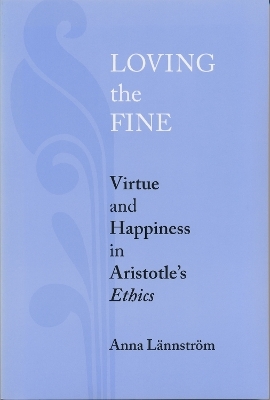
Loving the Fine
Virtue and Happiness in Artistotle's Ethics
Seiten
2006
University of Notre Dame Press (Verlag)
978-0-268-03402-3 (ISBN)
University of Notre Dame Press (Verlag)
978-0-268-03402-3 (ISBN)
Lännström probes Aristotle's view that desire is crucial to decision making and to the formation of moral habits. She pinpoints the 'love of the fine' as the starting point of any argument for ethics and as a crucial part of human happiness.
Assuming that people want to be happy, can we show that they cannot be happy without being ethical, and that all rational people therefore should be able to see that it is in their own best interest to be ethical? Is it irrational to reject ethics? Aristotle thought so, claims Anna Lännström; but, she adds, he also thought that there was no way to prove it to a skeptic or an immoral person.
Lännström probes Aristotle's view that desire is crucial to decision making and to the formation of moral habits, pinpointing the "love of the fine" as the starting point of any argument for ethics. Those who love the fine can be persuaded that ethics is a crucial part of our happiness. However, as Lännström explains, the immoral person does not share this love, and therefore Aristotle denied that any argument would convince the immoral person to become good.
Lännström maintains that Aristotle's Ethics speaks not just to ancient Greeks but to all those who already love the fine, aiming to help them improve their self-understanding and encouraging them to become better human beings. As a consequence, Aristotelian ethics remain viable today.
Written in accessible and lucid prose, Loving the Fine contributes to the renewed interest in Aristotle's moral philosophy and will be of interest to students of virtue ethics and the history of philosophy.
Assuming that people want to be happy, can we show that they cannot be happy without being ethical, and that all rational people therefore should be able to see that it is in their own best interest to be ethical? Is it irrational to reject ethics? Aristotle thought so, claims Anna Lännström; but, she adds, he also thought that there was no way to prove it to a skeptic or an immoral person.
Lännström probes Aristotle's view that desire is crucial to decision making and to the formation of moral habits, pinpointing the "love of the fine" as the starting point of any argument for ethics. Those who love the fine can be persuaded that ethics is a crucial part of our happiness. However, as Lännström explains, the immoral person does not share this love, and therefore Aristotle denied that any argument would convince the immoral person to become good.
Lännström maintains that Aristotle's Ethics speaks not just to ancient Greeks but to all those who already love the fine, aiming to help them improve their self-understanding and encouraging them to become better human beings. As a consequence, Aristotelian ethics remain viable today.
Written in accessible and lucid prose, Loving the Fine contributes to the renewed interest in Aristotle's moral philosophy and will be of interest to students of virtue ethics and the history of philosophy.
Anna Lännström is assistant professor of philosophy at Stonehill College.
| Erscheint lt. Verlag | 30.5.2006 |
|---|---|
| Verlagsort | Notre Dame IN |
| Sprache | englisch |
| Maße | 152 x 229 mm |
| Gewicht | 223 g |
| Themenwelt | Geisteswissenschaften ► Philosophie ► Ethik |
| Geisteswissenschaften ► Philosophie ► Philosophie Altertum / Antike | |
| ISBN-10 | 0-268-03402-8 / 0268034028 |
| ISBN-13 | 978-0-268-03402-3 / 9780268034023 |
| Zustand | Neuware |
| Haben Sie eine Frage zum Produkt? |
Mehr entdecken
aus dem Bereich
aus dem Bereich


